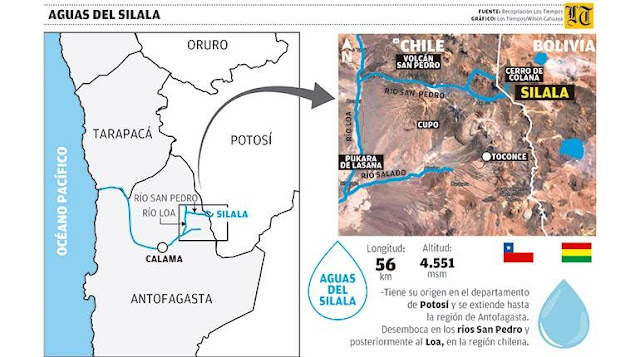Six years after Chile initiated the lawsuit against Bolivia in the International Court of Justice (ICJ), which seeks to ratify the international character of the waters of the Silala, this Friday the oral arguments between the two countries begin in The Hague. These will determine whether or not Bolivia has full sovereignty over the flow of the waters initiated in the country.
With an approximate length of 56 kilometers and an altitude of 4551 meters above sea level, the waters of the Silala are located in the Andean altiplano area, between the department of Potosí in Bolivia and the Antofagasta region of Chile.
According to an investigation carried out by the civil engineer and environmentalist Antonio Bazoberry and called "The Silala Myth", in 1904 the prefecture of Potosí granted a concession so that the Antogasta Bolivia Railway (FCAB) could build artificial channels and take advantage of the waters for its operation.
In this regard, Professor of International Law Sergio Castro explained that the prefecture of Potosí, through a supreme decree, annulled the concession in the 90's and Bolivia warned of cutting off the waters of the Silala. Chile responded with a possible military intervention.
During 2002, the Bolivian Ministry of Foreign Affairs publicly denied the existence of bilateral negotiations related to the waters of the Silala. Bolivia stated that the waters did not flow naturally to Chile and belonged exclusively to it. Through a communiqué, it announced the interruption of the flow of the waters to Chile or the initiation of an international lawsuit before the ICJ.
From 2006 to 2010, the governments of Evo Morales and Michelle Bachelet worked on a 13-point bilateral agenda, which included an agreement for the use of the waters of the Silala. This was made available to Potosí through a referendum, which attempted to add the payment of a historical Chilean debt for the use of the Silala without prior authorization. The decision was rejected by the neighboring country.
"The Chileans not only make an abusive and arbitrary use of our Silala waters, but they also do some more actions, they are drilling wells at 300, 400 meters so that their mining companies can take advantage of these subway waters", denounced in 2016 the former foreign minister and current vice president of Bolivia David Choquehuanca, who was part of the national delegation in the work of the bilateral agenda.
In March 2016, former President Evo Morales, in his protocol speech for the Day of the Sea, advanced that the country would go to the ICJ to denounce that Chile was "stealing waters from the department of Potosí".
"We have decided, as a pacifist country, that we are going to go to The Hague so that Chile respects our waters of the Silala in the department of Potosí. We are with legality, we are with international law, however, yesterday Chile through an authority answers us, tells us that no, that it is an international river", indicated at that time Morales.
Alerted by the statements, in June 2016, Chile files a lawsuit against Bolivia in The Hague. Subsequently, in August 2018, Bolivia responded with a counterclaim and counter-memorial before the ICJ.
Chile alleges that the Silala is an international river and Bolivia that it is a spring originating in its territory. Oral arguments will be held from April 1 to 14, 2022.
Chile knew how to take more advantage of the Silala than Bolivia did.
The professor of International Law, Sergio Castro, indicated that the waters of the Silala are mainly used by companies in the north of Chile, in the region of Antofagasta, bordering the Bolivian border.
"It is not only used by companies, but also for the consumption of people and for agriculture in certain areas. The Silala is a development pole for Chile," he assured.
In 2016, the then Chilean Minister of Foreign Affairs, Heraldo Muñoz, reported that the waters of the Silala were used by two companies: Ferrocarril Antofagasta Bolivia, belonging to the Luksic group, and by Codelco Chuquicamata division.
The former captures a total of 120 liters of water per second, while the latter captures 150 liters of water per second.
On the other hand, Bolivia in 2012 tried to implement a fishing zone, a dam and a mineral water bottling plant.
For Castro, it is very difficult for the country to take full advantage of the spring waters, due to its geographical position. He explained that the waters are located under two hills, approximately 700 meters above sea level, and a mechanism would have to be created to eliminate the distance.
Another option is to create tunnels to give passage from the Silala to Potosí. "Technically it is possible, but it would be a large investment", he assured.
Chile sues Bolivia before the ICJ in The Hague.
Chilean agent Ximena Fuentes filed the application for registration of the lawsuit against Bolivia in The Hague on June 6, 2016, stating that the Silala was an international river and Chile could also take advantage of its waters.
Bolivia responds with a counterclaim
Former President Evo Morales reported on August 31, 2018 that Bolivia had filed a counterclaim and counter-memorial before the International Court of Justice for the lawsuit initiated by Chile two years ago.
"Studies carried out confirm that a considerable flow flows artificially towards Chile due to works carried out in the last century," the former president assured on his Twitter account.
Start of oral arguments between Bolivia and Chile
After two years of the suspension of oral arguments due to the pandemic, the International Court of Justice announced, on March 9, the schedule of oral arguments between Bolivia and Chile in the Silala case.
They will begin on Friday, April 1 and will conclude on April 14.
Chile requests that the Silala be declared an international river and that it has equitable use of the waters. Bolivia indicates that it is a spring that arose in the country.

No comments:
Post a Comment